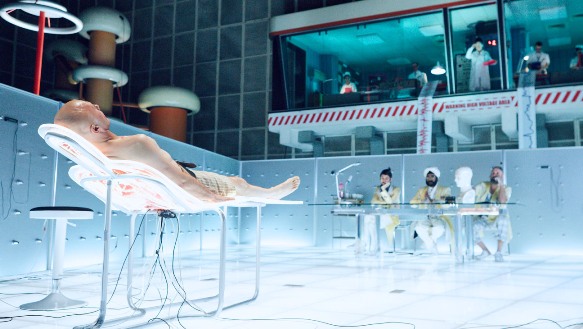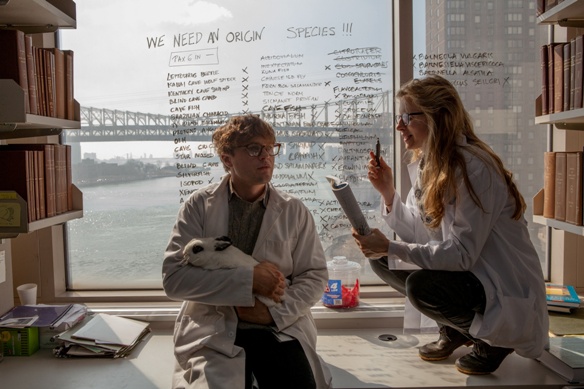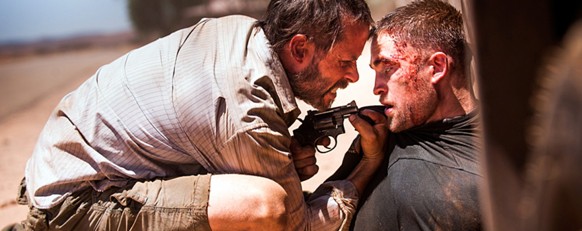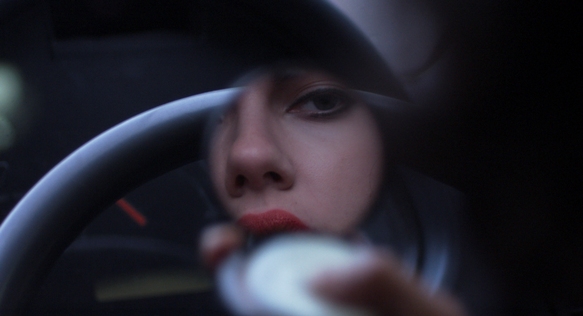
You will not want to miss UtopiaFest’s opening film: Terry Gilliam’s The Zero Theorem. It’s brilliant, and I cannot think of a better film to open a festival equally dedicated to the art of science fiction and fantasy, and the lucid consideration of our future. The director’s third dystopian satire, following Brazil (1985) and 12 Monkeys (1995), requires no familiarity with the previous films – just immerse yourself in the tantalizing dystopia Gilliam presents here. The not-all-that-distant future, as depicted by Gilliam, may be grim, yet the film is sensual, colorful, almost painterly in its visual aspect. Reminds me a bit of Hieronymus Bosch.
Qohen Leth is a small cog in the big wheels of Mancom, whose job is to “crunch entities.” Christoph Waltz imbues Qohen (pronounced interestingly like Cohen) with a sense of depth that goes far beyond idiosyncrasy and makes me care about this character from the start. Pat Rushin’s excellent screenplay makes subtle use of symbolism, it’s there to be discerned and make an impact, contributing to the meaning and emotional impact of the film, yet it is never overbearing or heavy. That Qohen is unhappy is a given, the source of his discontent and his efforts to ameliorate his situation are comic, engaging and touching. With, and against Qohen on this journey are his ridiculous yet somehow scary supervisor Joby (David Thewlis), his therapist Dr. Shrink-Rom – writ large and looney by Tilda Swinton, the lusciously uninhibited love/sex interest Bainsley (Mélanie Thierry), child wonder geek Bob (Lucas Hedges), and the ominous Management (Matt Damon). Once you see The Zero Theorem, you are very likely to want to see it again (I do). Happily, there are three screenings: September 13th at 19:30 and 20:00; September 18th at 16:30. Don’t forget that this is an excellent opportunity to see Brazil once more (or for the first time) on the big screen: September 15th at 17:00; September 19th at 22:00.
If you are going to dream, why not dream big? In the mid-70s filmmaker Alejandro Jodorowsky acquired the rights to Frank Herbert’s Dune. The interstellar saga dazzles the mind and senses, its cult status is well earned, and over the years has generated follow-ups, mini-series, computer games, a sad film by David Lynch in 1984, and a reference in one of my favorite music videos: Fat Boy Slim’s Weapon of Choice, directed by Spike Jonze and starring Christopher Walken. “If you walk without rhythm, it won’t attract the worm.”
But wait, whatever happened to Jodorowsky’s Dune? The eponymous documentary to be screened at the Utopia festival sets out to tell the tale of what director Richard Stanley calls “the greatest movie ever made… despite the fact that it does not exist.” Jodorowsky wanted to make a film that would feel like an LSD trip but without the use of hallucinogens, all that remains today are the memories, and two copies of the script, with storyboard illustrated by Moebius. By his own admission, Jodorowsky hadn’t read the book, but he “heard it was fantastic.” He’s a charming raconteur, with a wild imagination and energy to spare. Had he realized his dream, what would the film have been like, and what would have been its impact on film history? There are those who claim that the process of working on Jodorowsky’s Dune and the ideas generated therein, has influenced major films and filmmakers. Directed by Frank Pavich, Jodorowsky’s Dune is a trip in itself, and will be screened at Utopia on September 13th at 22:00; September 15th at 20:00; and September 20th at 21:30.
But enough of dystopian futures for the moment, let’s be optimistic, after all, science and technology have brought some awesome things into our daily lives and promise even more for the future. We already live longer, healthier lives. Diseases that were once considered a death sentence are now manageable, some formerly deadly diseases all but eliminated thanks to the availability of vaccines. A better informed public (thank you internet!) and proper prenatal care means that each succeeding generation of newborns has a chance at an even healthier, longer life. Healthy babies – now there’s a goal for society everyone can readily support. Or is it?
The Perfect 46, directed by Brett Ryan Bonowicz, recombines elements of our existing scientific and technological capabilities to create a thrilling, provocative film. The premise is simple: a scientist sets up a service that would check a couple’s genetic compatibility, as a way of avoiding genetic disorders. It’s not so very far from what many people do today when they are considering having a baby. Just about anyone expecting a baby would say that they want a “healthy baby,” but what does that mean? It’s easy to find consensus on eradicating a disease like Tay-Sachs (people of Ashkenazic Jewish origin are advised to test for the disease before trying to conceive); but what are the far-reaching implications of checking for genetic compatibility? What might be considered an “undesirable” genetic trait? Life-threatening diseases? Or anything that might be considered an impairment, which could be anything from heritable genetic diseases, to other inherited traits like height or skin color. The line between ensuring health and Eugenics is very, very thin and rather blurry.
Whit Hertford is magnificent as Jesse Darden, the scientist behind the start-up; brilliant, bold and beautifully flawed. The narrative is gripping and cleverly constructed -suspenseful, sexy, science. Screenings: September 15th at 20:15; September 17th at 18:45.

For all fans of Another Earth (I assume that’s everyone), the festival will be showing Mike Cahill’s second feature I Origins, and yes, Brit Marling will be there too. Merging love and science, the film follows Ian (Michael Pitt), a scientist researching the evolution of the eye in order to provide empirical evidence to disprove Creationism. A great loss leads him into a desperate journey, in which everything is questioned. Screenings: September 14th at 16:45; September 17th at 22:00.

The Rover is the second feature from David Michôd, a director who made a striking debut with Animal Kingdom in 2010. On the surface, the post-apocalyptic The Rover, starring Guy Pearce, may seem worlds away from the family crime drama of David Michôd’s first film, yet both films are marked by a chilling intensity and in their essence focus on similar themes. Michôd evokes a cinematic Steinbeck, depicting the landscape of desperation in all its cruelty, ruthlessness, violence and tenderness with poetic precision. Falling short of the Animal Kingdom‘s tight internal logic and acute investigation of the human character, The Rover is yet not without its own merit. Screenings: September 16th at 18:15; September 17th at 22:15.

Alien adventuress anyone? Jonathan Glazer’s Under the Skin is sci fi meets horror meets video art – all this and Scarlett Johansson too! Like the protagonist, the film is irresistible, but don’t expect standard exposition, or indeed, any exposition. Rather freely based on Michel Faber’s novel of the same name, the film follows its own trajectory, and at least for this viewer, the strategy works. Well aware of Johansson’s visual appeal, the camera lingers long and luxuriously on a face and form with the capacity to lure even the most diffident viewer of any and every sexual orientation. There is an overall surreal beauty to the film, and one might drift dreamily through this seductive thriller. Yet as compelling as Johansson’s charms is her gaze, and Glazer follows it faithfully throughout, making this a film that gives more food for thought than one might expect (no pun intended). Screenings: September 14th at 21:00; September 19th at 15:30.
Many, many more films worth seeing than I can write about, all the information is on the Utopia website at this link. If you want real science and not just fiction, see the documentary Particle Fever, and if you want pure fun, don’t forget Mel Brooks’ Spaceballs.





